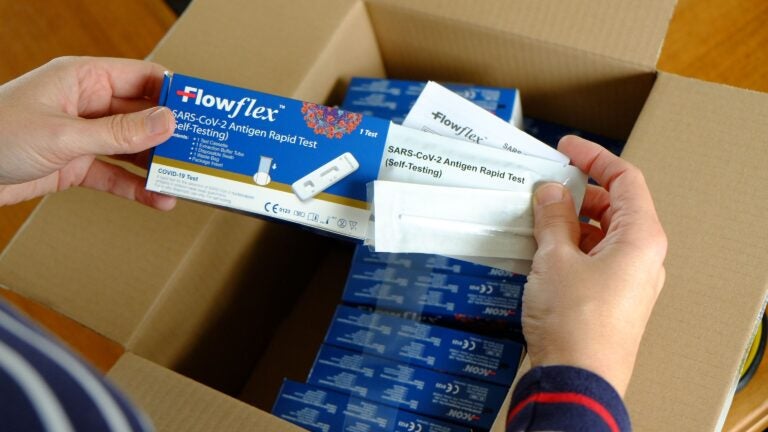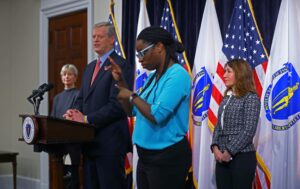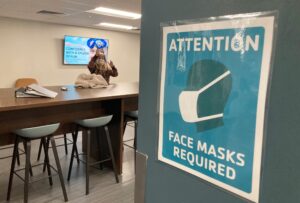Coronavirus
“People have been buying rapid tests for a while,” Gov. Charlie Baker said. “But one of the issues we wanted to deal with here was the fact that they’re not cheap.”
Massachusetts is trying to make rapid COVID-19 tests more available — particularly for lower-income individuals — as infection and hospitalization rates in the state continue to climb amid the holiday season.
But the effort extends beyond that.
Gov. Charlie Baker’s administration announced Monday that the state had purchased 2.1 million take-home rapid COVID-19 tests and would begin this week giving them to municipal officials to hand out for free.
Officials said the tests will be delivered to 102 cities and towns — representing over half the state’s population — that have the highest percentage of families below the poverty level. And while local officials have the freedom to decide how to best distribute the test kits, state officials are asking them to do so as quickly as possible and in a way that equitably prioritizes those most in need.
The full list of municipalities — which includes the state’s largest cities like Boston — is available online.
“The goal here is to help those families who face the greatest financial hardship and might have difficulty obtaining rapid tests at the pharmacy,” Baker said during a press conference Monday morning at the State House in Boston.
Baker also said his administration in the process of finalizing a plan to allow all cities, towns, and other public entities to “directly purchase test kits from manufacturers at fixed state negotiated prices” beginning in January.
Officials said the bulk-purchasing plan is aimed at providing local officials a relatively cheap way to extend the initial shipment and continue to make rapid tests available, especially for those who might not be able to afford them.
“COVID isn’t going away anytime soon,” Baker said.
The new effort comes amid a sharp increase in COVID-19 infections and hospitalizations over the last few weeks to levels not seen since the surge last winter. The demand for tests in the state is also about at an all-time high.
State officials have ordered hospitals facing capacity constraints to cut elective procedures by 50 percent. And some health experts are urging lawmakers to reimpose a statewide mask mandate for all indoor public places.
Baker stressed, however, that “this winter is very different than last winter” and said flatly that there are “no plans to bring back the statewide mask mandate.”
The governor primarily cited the state’s vaccination rate and the vaccines’ effectiveness at preventing severe illness.
Federal data shows that over 5 million people in Massachusetts — or 73 percent of all residents — are fully vaccinated and that more than 6 million have gotten at least one dose; nearly 1.5 million Bay Staters have gotten a booster shot.
“The fundamentally best and most important way for people to keep themselves and their family members safe is to get vaccinated, and if you’ve been vaccinated and you’re eligible to get boosted, get boosted,” Baker said.
Still, with the delta variant of COVID-19 and waning protection from the initial series of vaccinations resulting in an increase in breakthrough cases, Baker said that the take-home tests can be an additional precautionary step before indoor gatherings, especially with large numbers or different people.
“Let’s face it: This time of year, there are a lot of those kinds of activities,” Baker said. “And I think what we’re trying to do is to make it one more tool in the toolbox that can be used to make those events as safe as possible for people.”
Massachusetts Health and Humans Services Secretary Marylou Sudders said Monday that the state spent roughly $10 million for 2.1 million rapid COVID-19 tests from the California-based company iHealth Labs — paying about $10 for each two-test kit, which normally starts at $18 on the private market.
The tests can be self administered and deliver results in 15 minutes, without the need to send a sample to a laboratory. Individuals over the age of 2 can use the tests regardless of vaccination status or whether they have symptoms.
The state expects to deliver the test kits to local governments on a rolling basis through next week, beginning Tuesday, Baker said. They will also seek to be reimbursed by the Federal Emergency Management Agency.
While some states like Colorado and New Hampshire have launched programs offering to ship free rapid COVID-19 tests directly to residents’ homes, Lt. Gov. Karyn Polito said that the administration believes municipal officials are “best equipped to get the tests into the hands of our residents.”
“Whether it is through targeted outreach to families in need, public distribution sites, or other options, we know these communities can put these tests to very good use,” Polito said.
Officials also said they think the bulk-purchasing deal will provide a more consistent stream of supply of tests “at much lower” prices, according to Polito; it’s another way that communities can put federal COVID-19 funds to use.
Baker also noted that residents can continue to purchase rapid COVID-19 tests at local pharmacies and online, or visit a public test site.
“People have been buying rapid tests for a while,” Baker said. “But one of the issues we wanted to deal with here was the fact that they’re not cheap. And for us, the most important thing to do here was to make them available in those communities on a grand scale, that we make it possible for them to distribute them to a lot of the folks for whom the price tag is probably beyond their reach.”
Newsletter Signup
Stay up to date on all the latest news from Boston.com






